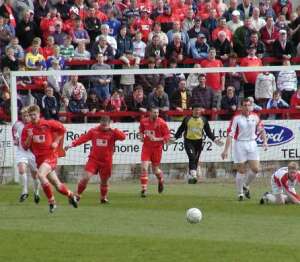|
These days, without such grave worries, my attention during the football season is almost entirely fixed on the Clarets. I do take a general interest in the game – I read the sports pages, watch the big matches and see the occasional game as a neutral when Burnley don’t play – but for the most part, I focus on the fortunes of my club.
This season, though, as we mark time in the first division, giving a few youngsters a run (who look promising, incidentally), that intensity has waned a little. I’ve found myself taking an interest in fortunes of other teams to which I have a connection – Sheffield Wednesday, whom I wanted to stay up, Carlisle whom I still hope avoid relegation, and Oxford United’s attempt to win promotion. In addition, there is a vast world of non-league football, which goes virtually unnoticed during the league season, but which is producing some of the finest stories of this campaign.
Which brings me back to teams going under. Fortunately, and remarkably given the state of finances at many smaller league clubs and some bigger fish even before this season, it is about the rarest even in football. In the past forty years, only two clubs have resigned from the league: Aldershot did so in early 1992, just as Jimmy Mullen’s claret and blue army was leaving the fourth division, and they followed Accrington Stanley, thirty years earlier.
This season has been a significant season for both those clubs. Accrington have already sealed a return to Nationwide football in the Conference next season, whilst at the time of writing, Aldershot required just a further point from four matches to make absolutely certain of following suit. Both clubs have mounted their charge upon gates way in excess of many clubs already in the Conference, or even in the football league.
Perhaps Aldershot’s is the more remarkable achievement. The re-formed club have been in existence for just ten seasons, and this will be their fourth promotion in that time. They started at the very bottom, playing teams whose attendances barely made double figures, at the same time as attracting some gates of their own in excess of a thousand. They were formed out of the ashes of a club who had folded dismally, by a group of supporters and players who cared enough to ensure there was still a club in the town. With gates now regularly exceeding 2000, and some gates having been much higher, there is every chance they could soon return to the league with a much healthier club than the one which departed.
Stanley have had longer to prepare their return, but that looked unlikely just a few years ago when they slipped into division one of the Unibond league. But fuelled with a dynamic chairman and a shrewd manager in John Coleman, and the financial backing provided by Brett Ormerod’s move to Blackpool and then on to Southampton, they have dominated the league this season.
|
This links to a much wider debate about whether we are football fans or Burnley fans first and foremost. Given the extent to which we concentrate on the Clarets, I suppose the answer must be that we are Burnley fans before we are football fans. But even if it might have a detrimental effect on my club, the football supporter in me will always admire a marvelous goal, or a fine story. In this case, I have to say I am pleased for Stanley, and I’m not even sure that it is necessarily going to have a major impact on Burnley.
If Stanley’s home game do not coincide with ours, then its effect will be virtually nil. Few people will put off a trip to Turf Moor a week in advance because they go to watch Stanley. Perhaps, even, the two clubs could make some sort of agreement to ensure their home matches do not coincide, for the benefit of both parties. It might even become a requirement, due to the practicalities of policing two football matches in such a comparatively small area.
Indeed, having a strong non-league club on the doorstep could in fact prove beneficial. It is another club to which our youngsters could be sent to gain some first team experience before they are ready for the first division. Many clubs already have some sort of tie-up with smaller clubs; there is no difference why this could not be pursued by Burnley and Accrington.
Burnley and Accrington occupied different football universes even before Accrington went into the wall. Even now, they still do. Accrington may have fought their way up the structure, but they do not represent a threat to us.
What both Accrington Stanley and Aldershot Town represent is a shining example of what can come of the bleakest of situations. They are now proud clubs who occupy strong positions in non-league football, whose achievements represent a remarkable achievement, and spread hope to clubs such as AFC Wimbledon, the non-league team to rise out of Wimbledon’s move to Milton Keynes. Football fans everywhere can take pleasure in two of the best comeback tales of the year.


